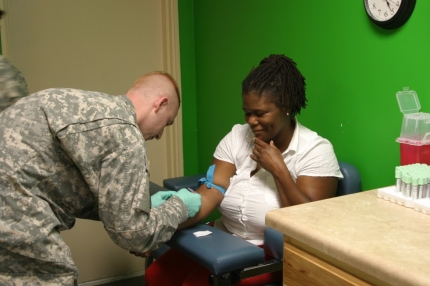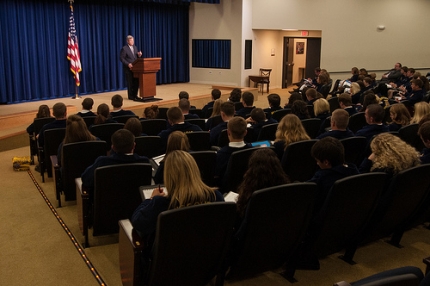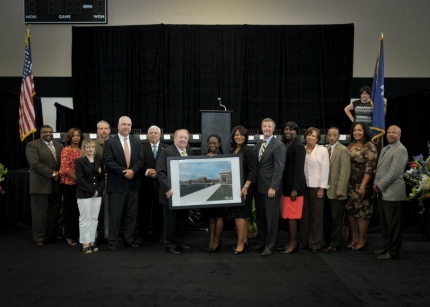White House Rural Council Blog
An Update on the White House Rural Council
Posted by on September 10, 2013 at 4:08 PM ESTEd. Note: This blog post was originally published by the Department of Agriculture.
Since the White House Rural Council was formed in 2009, our members from across the Federal government have taken a renewed look at many critical programs and services that impact rural residents, with an overarching goal to ensure that Federal agencies are collaborating to achieve the greatest possible benefit in rural America.
Today, I hosted a meeting of the White House Rural Council where we continued our focus on shared efforts to better serve rural America – from conservation, to veterans’ services, to rural development, to support for American agriculture and more.
Today’s meeting included a special focus on expanding rural access to health care. Rural Americans face unique barriers with regard to health care services, and new investments in medical facilities, expanded information technology and stronger veterans’ health care services can help meet these challenges.
While we look forward to a number of announcements in the weeks and months to come that are intended to strengthen rural health care capacity, the Department of Health and Human Services made two key announcements today in partnership with the White House Rural Council.
First, HHS announced that tomorrow, $4 million will be awarded through its Rural Health Information Technology Program to recruit, educate, train and retain health IT specialists in rural America. These awards will allow 15 organizations across the nation to train more healthcare workers in the specialized technology needed to better manage records and deliver remote services in rural America. As these services are expanded, more folks in rural areas will see streamlined management of health care records. Service will be more efficient. And it will be easier for specialists to help provide remote consultations through innovative new technology.
Learn more about RuralCollaborating to Deliver Healthcare, Education, and Outreach to the Mississippi Delta
Posted by on August 9, 2013 at 10:55 AM ESTFor the fifth year in a row, the Delta Regional Authority (DRA), a White House Rural Council member, is partnering with the Department of Defense (DOD) to provide rural health care via the Innovative Readiness Training (IRT) program. Working in the Mississippi Delta Region, where today 20 percent of the population is uninsured, this summer’s missions are taking on a new role by educating communities about the new and affordable coverage options that the Affordable Care Act is making available beginning in 2014.
Since 2009, IRT has brought military medical personnel in-training to underserved communities of the Delta region to provide free medical care to residents. DRA plays the vital role of guiding communities through the application, planning, and implementation processes. During the past four years, military reserve forces have provided general medical care, optical care, dental care, veterinary services, nutritional education, mental health care, and other support services to 24,000 Delta residents at ten sites across three states. And this summer, DRA and DOD are projected to reach an additional 20,000 patients in eleven communities across six states of the Delta – their most extensive outreach in the region to date.
Take the Hope of Martin medical mission in Martin, TN, where troops from the Navy Reserves, Air Force Reserves, and Air National Guard provided free health care services valued at more than $700,000 to more than 3,250 residents of western Tennessee. Along with immediate care, DRA has partnered with another White House Rural Council member, the Health Resources and Services Administration (HRSA) within the Department of Health and Human Services, to help DRA as it educates and connect patients to new health insurance options that will help them access affordable coverage long after the IRT mission is complete.
Another example is the Delta Medical Mission, which saw 5,771 patients and provided 10,000 resource cards at five sites over the month of July. And just this week, Army reservists were deployed to four communities in Arkansas, Kentucky, Missouri, and Tennessee for the Four State Medical mission as well as to Ferriday, Louisiana, for the Louisiana Medical program. In just three days, this mission has seen 1,400 patients.
Every patient served can mean a life changed. In Martin, TN, residents began lining up for services as early as 2 a.m. One man, so nervous to see a dentist that he was allowed to keep his dog in his lap, had tooth extractions that were years overdue. Another man was found in a hallway later in the day crying because, as he explained, with his new glasses – made on-site – “it was the first time he had been able to see the world.”
The success of IRT is a testament to interagency collaboration facilitated by the work of the White House Rural Council and reaffirming President Obama’s commitment to rural America.
Dr. Mary Wakefield is the Administrator of the Health Resources and Services Administration within the Department of Health and Human Services. Chris Masingill is the Federal Co-Chairman for the Delta Regional Authority. Doug McKalip is the Senior Policy Advisor for Rural Affairs, White House Domestic Policy Council.
FFA State Presidents ‘Suit Up’ for Agriculture
Posted by on July 25, 2013 at 5:53 PM ESTEd Note: Yesterday, Secretary Vilsack had the opportunity to speak with some of our nation’s brightest young leaders at the National FFA Organization’s State Presidents’ Conference. He discussed USDA’s efforts to revitalize the rural economy and recognized the officers for their commitment to leadership, personal growth and career success. Below is a blog post submitted to USDA by Clay Sapp, 2012-13 National FFA President. You can find the original post here.
This week is the National FFA Organization’s 2013 State Presidents’ Conference (SPC) in Washington, D.C. At SPC, state FFA officers are exposed to new ideas, meet new people and expand their perspectives as they sharpen their advocacy skills for tomorrow. Two officers from each state, Puerto Rico and the Virgin Islands are represented at this year’s conference, which carries the theme, “Suit up.”
At SPC, state officers undergo intense leadership training and develop a solid understanding of partner relationships. Their training is used to gather grassroots student input from across the nation on the future of FFA and agriculture education.
On Wednesday, our state officers were able to learn about key issues facing rural America, agriculture and education during a White House Rural Council meeting. We heard from U.S. Secretary of Agriculture Tom Vilsack, U.S. Secretary of Education Arne Duncan, executive director of Let’s Move and senior policy advisor on nutrition Sam Kass and senior policy advisor for rural affairs Doug McKalip.
Learn more about RuralSupporting Military Readiness and Training through Environmental Conservation
Posted by on July 17, 2013 at 1:43 PM ESTLast week, the Obama Administration announced a new federal, local, and private sector collaboration that will preserve agricultural lands and restore and protect wildlife habitat, all while helping to sustain military readiness.
Known as the “Sentinel Landscapes” partnership, the effort is kicking off with a pilot at Joint Base Lewis-McChord, an important training facility for our troops in the South Puget Sound region of Washington State, and home to some of the last remaining native prairie habitat for wildlife in the state.
This unique convergence of landscapes comes with unique challenges. Namely, as development comes closer and closer to the base, at-risk species in the area take refuge in the only land that can’t be developed, the military base itself. The presence of these species can then bring restrictions to the base’s ability to engage in certain training activities.
In a unique collaboration, the U.S. Department of Agriculture, the U.S. Department of Interior, and the Department of Defense will work together and with private landowners and state and local partners, including the non-profit Center for Natural Lands Management, to preserve and restore habitat around the base to ensure at-risk species can survive, while also improving military readiness by ensuring training activities can proceed unimpeded.
Building Community Leaders for Regional Success
Posted by on July 12, 2013 at 10:36 AM ESTEd. note: This is cross-posted from the Delta Regional Authority.
Strong leaders are integral to the success of Rural America, binding together neighbors, sustaining the deeply rooted culture, and searching for ways to keep the community moving forward. To ensure a future generation of Delta leaders, the Delta Regional Authority, a member of the White House Rural Council, began the Delta Leadership Institute Executive Academy.
Founded in 2005, the first Executive Academy class convened 22 people from the eight states of the Delta region to learn about the most pressing economic and social issues facing Rural America and collaborate to find common solutions to address these problems. Through leadership development sessions, communication trainings, case studies of successful models of change, and exposure to fellow community members and other parts of the region, the Executive Academy has created a corps of community leaders who have a vision for the Delta as a regional unit. The Academy is a network that shares successes, opportunities, and failures across state lines, and a group of leaders who have the tools to bring economic advancement and social change to their rural communities.
Over six sessions taking place in five cities around the region and in Washington, DC, participants discuss challenges in access to affordable health care and education, recruitment of business investment, retention of human capital, maintenance of necessary public infrastructure, and cultivation of entrepreneurial environments. Most importantly, though, these sessions provide participants with the opportunity to collaborate on crafting solutions for our region.
Learn more about RuralGrand Opening of Dillon’s New Middle School
Posted by on September 12, 2012 at 3:02 PM ESTOn Thursday, September 6, 2012, I had the honor of celebrating the beginning of a new era in Dillon County, South Carolina as Dillon opened its newest middle school.
Three and a half years ago, Dillon’s school system was spotlighted when Ty’Sheoma Bethea wrote a letter to President Obama. Ty’Sheoma’s letter inspired the President and his Administration to help rebuild her school, and her letter reminded all Americans of what we can accomplish by working collectively toward common goals.
In 2010, this Administration awarded a $35.8 million loan and a $4 million grant to the Dillon County School Facilities Corporation to finance new construction and renovations for four schools in three districts in South Carolina. These United States Department of Agriculture funds were made possible by the American Reinvestment and Recovery Act, which has assisted communities like Dillon across America prepare for and invest in the future.
The new middle school replaces J.V. Martin Junior High School and is Dillon’s first new school in about 40 years. Ms. Bethea’s letter spoke to the President’s belief that a strong country only exists when we equip our children with a quality education, so they are prepared to win the future.
- &lsaquo previous
- 1
- 2
- 3
- 4
- 5
- 6
- 7
- 8
- 9
- …
- next &rsaquo
White House Blogs
- The White House Blog
- Middle Class Task Force
- Council of Economic Advisers
- Council on Environmental Quality
- Council on Women and Girls
- Office of Intergovernmental Affairs
- Office of Management and Budget
- Office of Public Engagement
- Office of Science & Tech Policy
- Office of Urban Affairs
- Open Government
- Faith and Neighborhood Partnerships
- Social Innovation and Civic Participation
- US Trade Representative
- Office National Drug Control Policy
categories
- AIDS Policy
- Alaska
- Blueprint for an America Built to Last
- Budget
- Civil Rights
- Defense
- Disabilities
- Economy
- Education
- Energy and Environment
- Equal Pay
- Ethics
- Faith Based
- Fiscal Responsibility
- Foreign Policy
- Grab Bag
- Health Care
- Homeland Security
- Immigration
- Innovation Fellows
- Inside the White House
- Middle Class Security
- Open Government
- Poverty
- Rural
- Seniors and Social Security
- Service
- Social Innovation
- State of the Union
- Taxes
- Technology
- Urban Policy
- Veterans
- Violence Prevention
- White House Internships
- Women
- Working Families
- Additional Issues




